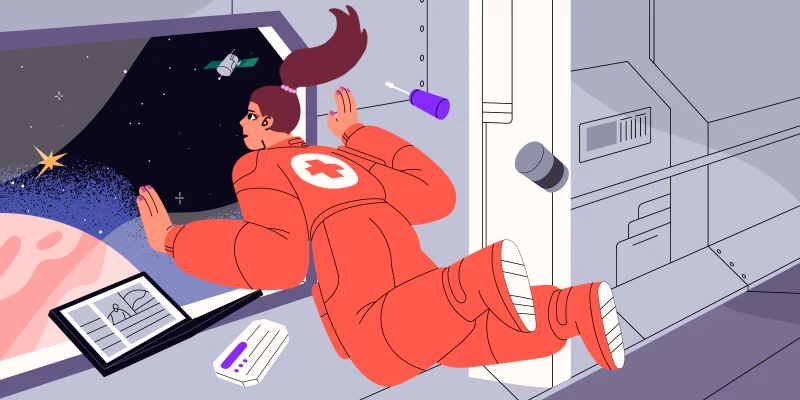Throughout neurology residency, I heard words of reassurance from faculty and fellows that I would secure a spot in our hospital's neuroimmunology fellowship. With such promises in mind, I had convinced myself that I did not have to apply to other programs. One day on my way back home from clinic, I opened my phone to an email that read, "We write with sincere regret to say that we are not able to offer you a place in the 2024-25 class."
I was told that the applicant pool was extra competitive, that this rejection was not a reflection of my own inadequacies but rather the exceptional qualifications of other applicants. As I skimmed the remainder of the email and forwarded it to my family without truly processing the words, my mind went numb and palpitations kicked in.
My immediate thought was: What was the point of putting myself through those 80-hour work weeks? Personal life decisions made with my husband — such as delaying having a child to focus on our medical careers, or buying a house with our limited trainee salaries — no longer seemed to matter. The career I envisioned came crashing down. I felt that the promise of a fellowship spot was taken away because I did not meet expectations, even though I was told by program leadership otherwise. It was difficult for me to see this rejection as anything but a personal failure.
For the next several months, I suffered from bouts of insomnia and piercing thoughts that I was not good enough in my professional or personal life. I no longer experienced the excitement of running a code stroke or seeing new consults. I was unable to be present as a wife, sister, daughter, and friend, hitting an all-time low when I forgot my best friend's birthday. I was clearly not equipped with the tools necessary to overcome professional rejection. As such, the ramifications were transgressing into my personal life, which incentivized me to seek help from a therapist and career coach. After months of tremendous self-reflection, I took away three key lessons that helped me recover from the job rejection.
Many People Are Deserving Candidates
At first, I had anger over what I saw as an unfair decision. However, as I took the time to articulate my thoughts during therapy and coaching sessions, I came to realize that just because I felt deserving of the job did not mean I was entitled to getting it. Because I was an internal candidate, I had this sense that I would automatically have an advantage coming into the fellowship. And while many training programs in medicine have an internal pipeline to recruit medical students or residents from their own respective institutions, I also see how such favoritism creates barriers for hiring more qualified candidates at other institutions. There are many talented and well-deserving candidates who apply for positions with limited spots. Recognizing the vast talent pool I was up against helped me see that rejection is a natural part of a competitive process, and that I happened to get outmatched this time.
Verbal Promises Are Not Commitments
I also had to face the embarrassment that came with the rejection. I felt blindsided that "so and so" told me "such and such" that led me to believe I did not need to have a backup plan. I had the naivete to take what I was being told at face value, but the reality is that verbal reassurances are not commitments. What I was told may have been true in the moment, but without a written, binding contract, those making the hiring decisions are free to change their minds and reconsider prospective applicants. Moving forward, I learned that I needed to be cautious of verbal promises and to always have a Plan B. If someone does say they are committed to hiring me, then it is important to get that commitment in writing to hold that person accountable.
Find Positivity At Work
One resiliency strategy that helped me the most was focusing on aspects of my current job that I could control. I cannot control hiring decisions, but I can be intentional in choosing positivity at work. I focused on finding ways to incorporate energy-giving activities in the workday by incorporating a 10-minute walk outside and making my computer password something that brought me joy (I think at one point my password was based off a song from the artist Doja Cat).
As a senior resident leading medical teams, I could control my approach to rounds and made it a priority to optimize my junior residents' experiences. I designed a bedside rounding structure that enabled me to write progress notes to relieve the juniors of one burdensome administrative task. On the first day I attempted bedside rounds, my attending rejected my plan for a patient's medical care in front of the junior residents, nurses, and patient. I chose to positively reframe the situation: Maybe I could be a senior who models acceptance of mistakes. Perhaps that would leave a more lasting impression than if I had gotten the patient's plan "right."
There was a period of time in which my future career plans were in complete limbo. I made the decision to try again, this time applying for a headache fellowship, a specialty I had initially planned for the following year but now had the opportunity to do earlier. I went into the application and interview process knowing that getting rejected again was a possibility. But this time, I had a blueprint to recover from a potential job rejection with the insights I had gained.
Six months later, I open an email that read, "Congratulations, you have matched!"
Minali Nigam, MD, MA in journalism, is a current headache fellow at the Mass General Brigham and Harvard Medicine Combined Program. As a physician-journalist, she hopes to make medical knowledge accessible and to share stories that connect with diverse audiences. In her free time, she enjoys swimming, biking, running and spending time outdoors with family.
Image by z_wei / Getty





